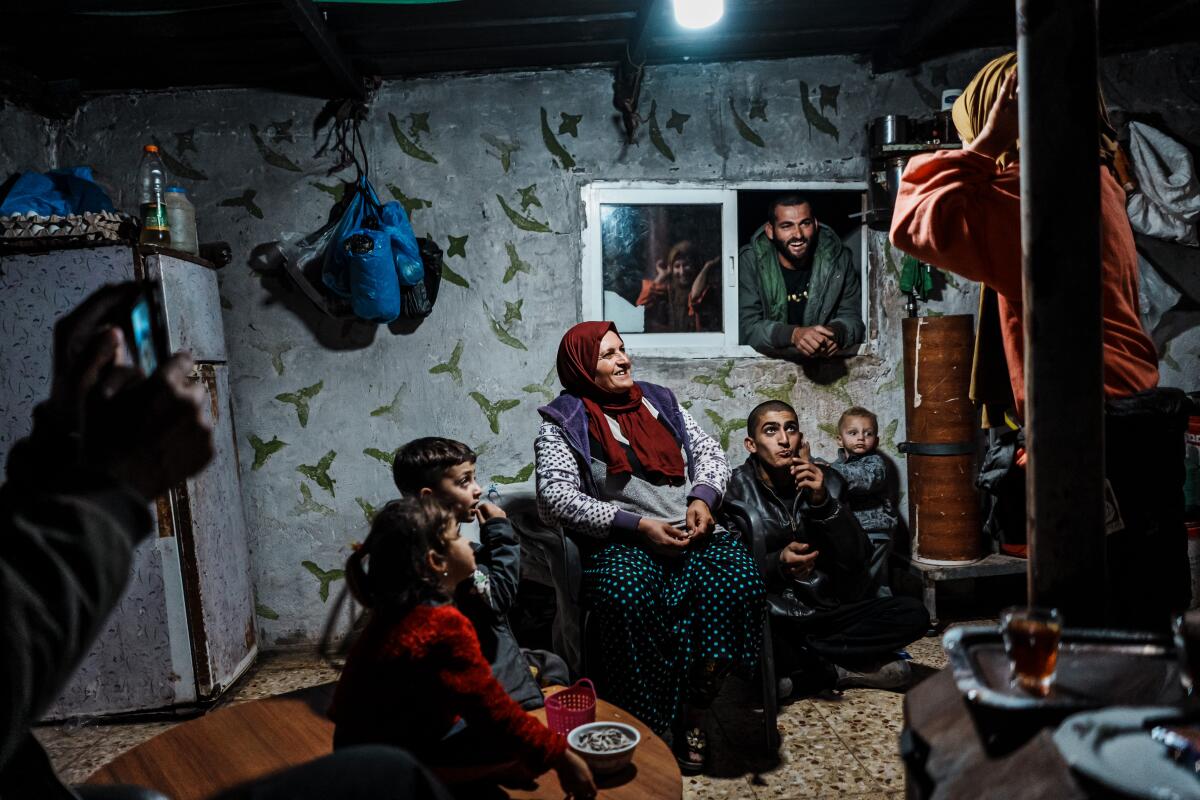U.S. pulling visas from Jewish Israeli settlers who attack West Bank Palestinians

- Share via
WASHINGTON — The Biden administration on Tuesday announced it was banning dozens of Jewish Israeli settlers from traveling to the U.S. because of their involvement in brutal attacks on Palestinians in the occupied West Bank aimed at driving people from their homes and taking away their land.
Extremist settlers suspected of violence who already have U.S. visas will find them to be canceled, and any applying now for a visa will be denied, U.S. officials said. The measure is punitive: Many settlers have family in the U.S. and highly value having a visa for travel there.
The settlers’ attacks are unacceptable, Secretary of State Antony J. Blinken said in making the announcement Tuesday.
“We have underscored to the Israeli government the need to do more to hold accountable extremist settlers who have committed violent attacks against Palestinians in the West Bank,” Blinken said in a statement.
U.S. officials said they were taking action because Israel has largely failed to arrest, prosecute or punish settlers who have burned Palestinian homes and olive groves, stolen their sheep and shot members of Palestinian families.
The politically powerful settler bloc is part of Prime Minister Benjamin Netanyahu’s right-wing government.
The Biden administration views the two-state solution — an independent Palestinian state alongside Israel — as the only way to stop generations of violence.
The Palestinian Authority, which nominally governs the West Bank, says 260 Palestinians have been killed there since Oct. 7 in various attacks.
A number of West Bank Palestinians who have engaged in violence against Israelis will also be subject to the visa ban, U.S. officials said. The number is smaller because Israel usually arrests Palestinian offenders while ignoring the Jewish settlers guilty of similar crimes, U.S. officials said.
Palestinians regard the West Bank as part of a future independent state. But settlers also lay claim to the land and have constructed communities across the West Bank, chopping it up into a noncontiguous pieces that would make a cohesive Palestinian state next to impossible. The settlements are considered illegal under international law.
In Israel, initial reaction to the visa ban was angry. Benny Gantz, a former opposition politician and now member of the war cabinet, said at a news conference that the majority of settlers in the West Bank were “law-abiding people” and that the violence was only the work of a group of extremists.
Even before the Oct. 7 attacks in southern Israel by the Hamas militant group, which touched off the now 2-month-old war in the Gaza Strip, Palestinians in the occupied West Bank were being terrorized by settlers.
U.S. officials are trying to shore up NATO support for the Ukraine war effort without losing sight of the Israel-Hamas conflict.
At the same time, the Israeli army was mounting numerous raids in the West Bank, killing dozens of Palestinians, some civilians and others whom Israel claimed to be militants from various groups, such as the Palestinian Islamic Jihad.
It was the deadliest period for Palestinians since the second intifada, or uprising, which began in 2000.
Israeli and Palestinian human rights groups say the most insidious West Bank violence comes from the settlers, who act as vigilante mobs with impunity, often under the protection of Israeli soldiers.
U.S. officials have referred to the settlers’ actions in the West Bank as Jewish terrorism. They said they are confident they have enough evidence to choose which settlers to ban, even though they have not faced an Israeli court. Stability in the West Bank is essential, the officials said, to prevent the current war from spreading beyond Gaza.
U.S. authorities will begin issuing the bans Tuesday, and “more will be coming in the coming days,” State Department spokesman Matthew Miller said. “We expect ultimately this action will impact dozens of individuals and potentially their family members.”
Blinken and others have repeatedly urged the Netanyahu government to crack down on rampaging settlers, to no avail. Last week in Israel, Blinken told Netanyahu that the U.S. would take the visa restriction actions regardless of what the Israeli government does in response.
What impact the move will have remains to be seen. Israeli civilian and military authorities have appeared largely impervious to U.S. entreaties to minimize civilian casualties in the war and to allow the entry into Gaza of food, medicine, water and fuel.
Blinken, Defense Secretary Lloyd J. Austin III and Vice President Kamala Harris in recent days have repeatedly lamented the number of Palestinian deaths in Gaza and told Israel that its offensive launched this week in the southern half of the Gaza Strip must not replicate the devastation of the barrage on the northern half.
But the death toll in southern Gaza, especially around the city of Khan Younis, is already similar to that of the first days of the northern offensive. Israel ordered Gazans to flee to the south for safety and is now attacking the south, to where more than a million people have been displaced.
Under U.S. pressure, Israel agreed to set up “de-confliction” zones, or safe areas, in which Palestinians can shelter, but the United Nations and other aid groups say those areas are vastly overcrowded, suffering without sufficient food or water, and are not necessarily safe.
Israel is also notifying Gazans of neighborhoods that will be bombed so that they might flee. But the notifications usually require receivers to have access to electricity or an internet connection to be effective, and few Gazans have either, U.N. officials say.
Miller said that it was too soon to evaluate the civilian death toll in the south, but that “Israel is not doing enough” to ease the humanitarian siege.
New focus, meanwhile, is being given to reports of rape and sexual violence committed by Hamas against Israeli women and girls. Hamas has said it did not use rape as a weapon of war, but testimony from witnesses is being gathered by the U.N. and Israel that describe numerous cases of sexual torture.
“Over the past few weeks, survivors and witnesses of the attacks have shared the horrific accounts of unimaginable cruelty,” President Biden said Tuesday. “Reports of women raped — repeatedly raped — and their bodies being mutilated while still alive — of women corpses being desecrated, Hamas terrorists inflicting as much pain and suffering on women and girls as possible and then murdering them. It is appalling.”
Biden said Hamas’ refusal to release a last batch of female hostages, ages 20 to 39 and mostly civilian, caused Friday’s collapse of a fragile truce that had seen freedom for about 100 hostages and a surge in humanitarian aid for Gaza. Fighting immediately resumed.
In addition to hostage-taking, the Hamas attacks on Oct. 7 killed 1,200 Israelis and foreign nationals, mostly civilians, Israel said, and Israeli bombardment of the densely populated Gaza enclave has killed at least 16,000 people, according to the Hamas-controlled Gaza Health Ministry.
More to Read
Get the L.A. Times Politics newsletter
Deeply reported insights into legislation, politics and policy from Sacramento, Washington and beyond. In your inbox twice per week.
You may occasionally receive promotional content from the Los Angeles Times.











